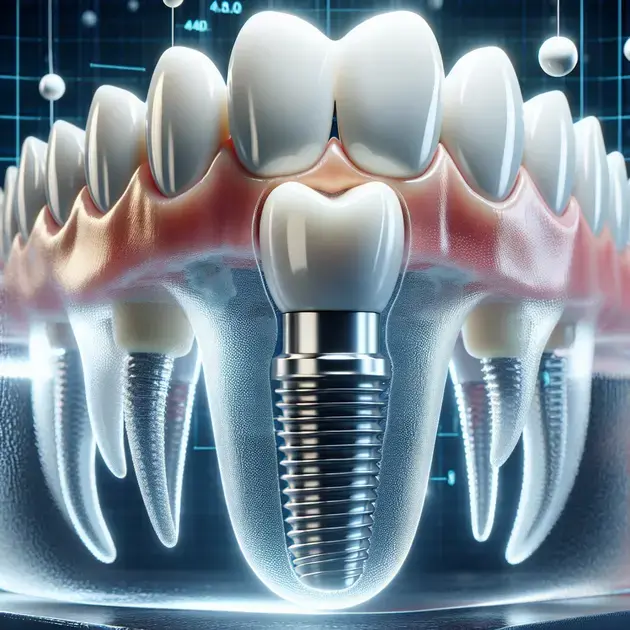The advancements in implantation dentistry have revolutionized the way missing teeth are replaced. In this comprehensive guide to dental implants, we will delve into the benefits, procedure, and aftercare involved in this modern dental solution.
Dental implants offer a long-lasting and natural-looking alternative to traditional dentures or bridges. With a success rate of over 95%, it is a popular choice for individuals looking to restore their smile and improve their overall oral health.

The Benefits of Dental Implants
Dental implants offer numerous benefits for individuals looking to replace missing or damaged teeth. One of the key advantages is improved appearance and self-confidence. Since implants are designed to look and feel like natural teeth, they can enhance the overall aesthetics of a person’s smile. Additionally, dental implants provide better durability and longevity compared to other tooth replacement options such as dentures or bridges.
Another significant benefit of dental implants is improved oral health. Unlike traditional solutions that may require altering adjacent teeth, implants integrate seamlessly into the jawbone without impacting surrounding teeth. This helps to preserve the natural tooth structure and promotes better long-term oral health.
Furthermore, dental implants offer enhanced comfort and functionality. With implants, individuals can enjoy restored chewing ability and speech clarity, leading to an overall improvement in quality of life. Unlike removable dentures, implants eliminate the inconvenience of daily removal and cleaning, providing a permanent and hassle-free solution for tooth replacement.
From a structural standpoint, dental implants also help to maintain bone density in the jaw. When a tooth is lost, the surrounding bone tissue can begin to deteriorate over time. Implants act as artificial tooth roots, stimulating the jawbone and preventing bone loss. This preservation of bone density contributes to facial symmetry and prevents issues such as sagging of the face.
In terms of long-term cost-effectiveness, dental implants prove to be a worthwhile investment. While initial implantation may require a higher upfront cost compared to other options, the durability and longevity of implants often result in lower maintenance and replacement expenses over time. This makes dental implants a cost-effective solution for individuals seeking a permanent and reliable tooth replacement option.
Understanding the Implantation Procedure
The implantation procedure for dental implants typically involves several steps to ensure a successful outcome. The first step is a comprehensive examination and treatment planning, where the dentist assesses the patient’s oral health and creates a customized treatment plan. This may include X-rays, impressions, and other diagnostic tests to determine the optimal placement of the implants.
Once the treatment plan is established, the actual implantation process begins with the placement of the implant into the jawbone. This step may require minor surgery under local anesthesia to ensure patient comfort. The implant serves as a foundation for the artificial tooth or teeth that will be attached later in the process.
After the implant is placed, a healing period of several months is necessary to allow the implant to integrate with the jawbone through a process called osseointegration. During this time, the patient may be fitted with a temporary restoration to maintain functionality and aesthetics.
Once the implant has fully integrated with the jawbone, the final restoration is attached. This may involve placing a dental crown, bridge, or denture onto the implant to complete the tooth replacement. The dentist will ensure proper fit and functionality of the restoration before finalizing the procedure.
Post-implantation care is essential to promote healing and prevent complications. Patients should follow all post-operative instructions provided by their dentist, including proper oral hygiene practices and regular follow-up appointments. By adhering to these guidelines, individuals can maximize the success and longevity of their dental implants.
Aftercare Tips for Dental Implants
Proper aftercare is crucial to maintaining the health and longevity of dental implants. One of the key aftercare tips is to practice good oral hygiene, which includes brushing and flossing regularly to keep the implant and surrounding teeth clean. Using a soft-bristled toothbrush and non-abrasive toothpaste is recommended to avoid damaging the implant or restoration.
Regular dental check-ups are essential for monitoring the condition of the implants and identifying any potential issues early on. Dentists can perform professional cleanings and examinations to ensure the implants are functioning properly and are free of any complications.
Avoiding harmful oral habits such as smoking and excessive alcohol consumption is also important for the success of dental implants. These habits can negatively impact healing and increase the risk of implant failure. Maintaining a healthy lifestyle and diet can help promote overall oral health and support the longevity of dental implants.
In cases where additional dental work is recommended, such as the placement of a dental bridge or crown, it is important to follow the dentist’s instructions carefully. Proper care and maintenance of the restoration can help prolong its lifespan and prevent the need for premature replacement.
Lastly, patients with dental implants should be mindful of any discomfort, pain, or changes in the implant area and promptly notify their dentist if any issues arise. Early intervention can help address potential complications and preserve the integrity of the implants for years to come.

Step-by-Step Guide to Dental Implant Surgery
When considering dental implant surgery, it’s important to understand the process step by step. The first step is the initial consultation with your dental implant specialist to assess your oral health and determine if you are a suitable candidate for the procedure. This is followed by the treatment planning phase, where a personalized treatment plan is created for you.
Next comes the surgical procedure, where the dental implant is placed into your jawbone. This will require some healing time to allow the implant to fuse with the bone. After the healing period, an abutment is placed on the implant to connect it to the dental crown, which is the final step in the process.
Throughout the entire process, your dental implant specialist will provide you with detailed instructions on how to care for your dental implant to ensure its success. Regular follow-up appointments will also be scheduled to monitor the healing process and the functionality of your new dental implant.
By following this step-by-step guide to dental implant surgery, you can have a better understanding of what to expect during the procedure and how to properly care for your dental implant for long-term success.
Common Myths About Dental Implants
There are several common myths surrounding dental implants that can cause confusion and hesitation for individuals considering this procedure. One common myth is that dental implants are extremely painful. In reality, with advancements in technology and anesthesia, most patients report minimal discomfort during and after the surgery.
Another myth is that dental implants are not a permanent solution. In fact, dental implants are designed to be a long-term, if not permanent, solution for missing teeth. With proper care and maintenance, dental implants can last a lifetime.
Some people believe that dental implants are only for older adults. However, dental implants can be a suitable option for individuals of all ages who have lost a tooth due to injury, decay, or other reasons.
Additionally, there is a misconception that dental implants require special maintenance. The truth is, dental implants should be cared for just like natural teeth with regular brushing, flossing, and dental check-ups.
By debunking these common myths about dental implants, individuals can make a more informed decision about pursuing this effective and long-lasting solution for missing teeth.
Choosing the Right Dental Implant Specialist
When it comes to choosing the right dental implant specialist, there are several factors to consider. Start by researching the credentials and experience of potential specialists. Look for a specialist who is board-certified and has extensive experience in performing dental implant surgeries.
It’s also important to consider the specialist’s reputation and patient reviews. Reading reviews from past patients can give you insight into the quality of care and results you can expect from the specialist. Additionally, consider scheduling a consultation to meet the specialist in person and discuss your specific needs and concerns.
Another important factor to consider is the technology and techniques used by the specialist. Opt for a specialist who utilizes the latest advancements in dental implant technology for improved accuracy and success rates.
Lastly, consider the location and convenience of the specialist’s practice. Choose a specialist whose office is easily accessible and convenient for regular follow-up appointments and emergency visits if needed.
By carefully considering these factors, you can confidently choose the right dental implant specialist for your oral health needs, ensuring a successful and satisfying dental implant experience.
Conclusion
Understanding the step-by-step guide to dental implant surgery is crucial for individuals considering this procedure. From the initial consultation to the placement of the dental implant and the final crown attachment, each phase plays a vital role in the success of the implant. Following the detailed instructions provided by your dental implant specialist and attending regular follow-up appointments are key components in ensuring the long-term success of your dental implant.
Debunking common myths about dental implants is essential in helping individuals make informed decisions. By clarifying misconceptions about pain, permanence, age restrictions, and maintenance, individuals can feel more confident in pursuing dental implants as a solution for missing teeth. With advancements in technology and proper care, dental implants can offer a lasting and effective remedy.
When selecting the right dental implant specialist, it’s important to consider factors such as credentials, experience, reputation, and technology used. By researching and scheduling consultations, individuals can make an educated choice that aligns with their oral health needs. Choosing a specialist with the latest techniques and a convenient location can contribute to a successful and satisfying dental implant experience.